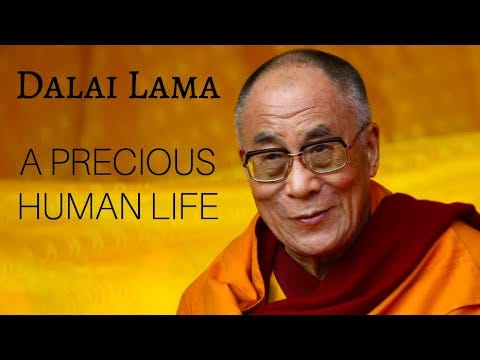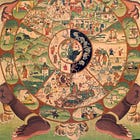Tibetan Buddhist Lamrim: Your Precious Human Life
The Lamrim teachings in Tibetan Buddhism place great importance on recognizing the value of a precious human life on the spiritual path.
Most people take their lives for granted and fail to recognize its significance. Since none of us can stop being human, and each day we wake up, we are human, it’s understandable why few bother to appreciate it. As Popeye the Sailor Man noted, “I yam what I yam.”
Tibetan Buddhist Lamrim invites us to pause and reflect on the meaning and unique opportunities a human life provides.
There are billions of conscious life forms on planet Earth. Each one of them has a subjective experience.
Have you ever wondered what it’s like to be a bat? It’s not a childish daydream; it’s a deep philosophical question.
You could have incarnated as an animal. What would your life have been like then?
Buddhists focus attention on the preciousness of human life because it motivates practitioners not to waste their time and effort on frivolity or worldly concerns.
A concise explanation from the Dalai Lama.
Why human life is precious
I believe life is an adventure. Not every experience is pleasant or joyful, but every moment is fresh and new, and full of possibility. Zen Buddhists call this Shoshin, a feeling of openness, eagerness, and lack of preconceptions.
Every experience in life, pleasant, unpleasant, or neutral, is a wonderful gift. Perhaps from God, or Fate, or whatever belief feels right to you.
Seeing life as a gift, particularly human life, is an essential attitude for living meaningfully, mindfully, and with an open heart.
Contemplate these teachings from Lamrim:
Rare and Precious: A precious human life is regarded as exceptionally rare in the cycle of birth and rebirth (samsara).
Potential for Enlightenment: A human life offers a unique opportunity to progress on the path to enlightenment (Buddhahood). It is a platform for realizing one's spiritual potential.
Impermanence: The impermanence of life and the uncertainty of death make it essential to utilize this opportunity while it lasts.
Freedom and Opportunity: Having a human life provides the freedom and opportunity to engage in spiritual practices, and be a force for good in the world.
Helping Others: Another aspect of your precious human life is the potential to benefit others through practicing altruism and helping others on their spiritual journeys.
Purposeful Living: Only humans have the potential to lead a meaningful life by cultivating positive qualities such as compassion, loving-kindness, wisdom, and ethical conduct. This involves avoiding negative actions and negative states of mind.
Mind Training: To unlock the full potential of human life, Lamrim teaches practitioners techniques for training the mind, such as contemplation, mindfulness, and virtue meditation. Only human beings can do this.
Lamrim, the lamp on the path to enlightenment
Many people enjoy lives of opulence, fame, and hedonistic pleasure. At times, these people find life enjoyable, perhaps even special. However, worldly pursuits are fickle, and the pleasure is ephemeral.
Contemplating virtue and holding those feelings in the heart is the essence of Lamrim, the stages in the complete path to enlightenment as taught by Buddha.
Contemplation
Lamrim meditations have two parts, the contemplation and the object of meditation.
Contemplation involves reflecting deeply on a specific topic or concept related to Buddhist teachings and engaging intellectual and analytical faculties. In this instance, your precious human life.
When I first studied philosophy and spiritual teachings, I learned many things on the intellectual level, but I always stopped there. I didn't know there was a deeper level of knowing, and I certainly didn't know how to get there.
What I learned through practicing Lamrim was that for these teachings to be of any use, they needed to be more deeply integrated into my mind and heart. The method for achieving this is meditations on virtuous objects.
The Lamrim contemplations serve to generate a specific realization or feeling in the mind and heart. That feeling is the object of meditation.
What you find when practicing this form of meditation is that by holding the feeling, and returning to it if you lose it, it gets more deeply integrated into your mind, finding a home deep in your subconscious.
I imagine some psychologist has an explanation for this. I only know that it works. The more time you spend in meditation on virtuous objects, the deeper your realizations become, and the more these feelings serve to guide your behavior, endow peace of mind, and summon happiness.
The contemplation for this meditation is the writings above.
Object of Meditation
The traditionally taught object of meditation is simple, "I must practice Dharma," the teachings of the Buddha and Lamrim in particular.
If you are uncomfortable with making that leap just yet, may I suggest an alternative object of meditation?
Did you notice as you read the contemplation a desire to do something meaningful with your life? Meditate on that.
I will make the most of my life, improve my self-discipline, and work toward the benefit of others.
If the contemplation on the value of your precious human life has meaning for you, that feeling should arise naturally. Hold onto it as long as you can. That is the object of your meditation.





